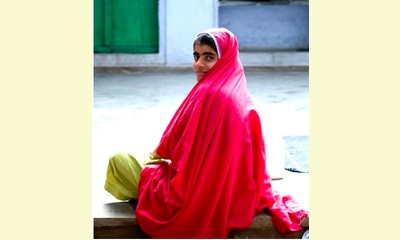|
|
Day of the Girl Child -- Writings by Afghan women
un articulo por Maryam Zar, Huffington Post (reproduced and abridged within the principles of "fair use")
On December 19, 2011, the United Nations General Assembly
adopted Resolution 66/170 to declare October 11th as the
"International Day of the Girl Child", in an effort to bring stark
recognition to the universal truth that girl's rights are commonly
withheld around the globe, and the challenges they face are unique
to their gender. 
click on photo to enlarge
This year the theme of the International Day of the Girl Child . . . is
empowering adolescent girls. Every year, nearly 10 million girls
succumb to child marriage, and are given away as brides before the
age of 18, with no say in the matter. They are rarely schooled, and
are the first to be pulled out if there are chores to be done or work
to undertake to feed an ever growing family. They are often
assaulted, physically and sexually, while performing chores like
fetching water or wood, or worse - while at home, caring for
children or younger siblings or just finding respite in a refuge they
never can find. . .
IDGC is intended to draw attention to the uncontested fact that
everywhere in the world girls face some sort of discrimination. To
be free from violence, to have access to education, to be able to
work or own land, to gain in inheritance or to decide when and
whether to marry are rights many girls and women do not enjoy. It
is all too common for girls to be denied agency over their bodies,
denied the freedom to think and learn, denied the choice to marry
or to procreate when they are ready in body and mind . . .
The freedom to write is empowering. When girls are empowered,
they thrive. So it is in the spirit of empowerment, and in a bid to
amplify the voice of the girl child, that Womenfound is partnering
with the Afghan Women's Writing Project (AWWP) from this month to
publish the works of Afghan women and adolescent girls in the
Huffington Post. The AWWP works on the ground in Afghanistan to
empower women and girls with the mighty pen. In 1839 an English
author famously said, the pen is mightier than the sword. Nowhere
is this more true than in its application to girls around the world
today, who risk life and limb for an education and the power to
speak their mind. The aim of this monthly blog is to give girls a
platform through which to say their piece and be heard.
Today, to mark International Day of the Girl, what will you do? How
will you empower an entire gender left behind in our 21st century
world of unsurpassed advancement, luxury and digital connectivity?
You can begin by reading. Read these selected pieces by young
female Afghan writers, and join the IDGC in empowering
adolescent girls by giving them voice.
[Thank you to Janet Hudgins, the CPNN reporter for this article.]
|








|
DISCUSSION
Pregunta(s) relacionada(s) al artículo :
Gender equality in education, Is it advancing?
* * * * *
Comentario más reciente:
:
Re: Gender equality in education: is it advancing
Considering that the first women to somehow get into universities was in the 19th C, we are making tortoise-like progress. Although there are more women than men in most schools now they tend toward the Arts where they are scorned by men in science. That's the kind of thing that was passed around 60 - 70 years ago but it's still here today. But, there is a trend that will make a difference quite soon: the majority of regional politicians are women who are Arts grads and they are going to shift the weight of policy to domestic from global. That will mean less war, more peace, more freedom and better education for women.

|
|









